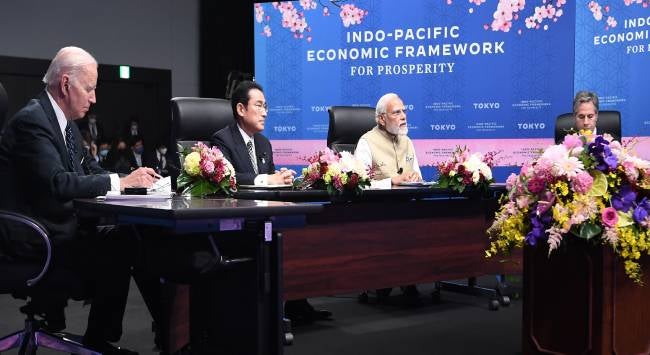Summary
Labour standards are part of the Indo-Pacific Economic Framework (IPEF) discussions and will be controversial. The United States must ensure its emphasis on projecting a worker-centric American trade policy that does not result in the IPEF imbibing labour standards unlinked to productivity.
The Indo-Pacific Economic Framework for Prosperity (IPEF) would have its first in-person ministerial in California from 8 to 9 September 2022. One of the issues that is expected to be discussed at the ministerial and subsequent discussions is labour standards. This will be one of the most controversial subjects in the negotiations.
Labour standards are at the heart of United States (US) President Joe Biden administration’s trade strategy. The strategy is emphatic in preventing the use of forced labour in international trade, specifically in the trade between the US and its partners.
From a trade perspective, the use of forced labour broadly implies engaging labour at sub-optimal wages and/or without providing adequate workplace safety or occupational support. For example, using labour at lower than minimum wages and without supportive working conditions like workplace safety and medical benefits lowers production costs for businesses using such labour. Lower costs lead to lower prices for traded goods and services, providing them with an edge over other competitors in global trade.
The Biden administration has put the interests of American workers at the forefront of its trade policy. It would walk the extra mile to ensure that US goods and services produced by American labour working under fair domestic standards do not get outcompeted by those produced by its trade partners that do not adhere to such standards. Washington would, therefore, be keen on drafting labour standards consistent with its own in the IPEF.
The intention to work with Indo-Pacific trade partners on labour standards and make them “an example for the rest of the world to follow” was evident from the US Trade Representative (USTR) Katherine Tai’s comments during the announcement of the development of a trade strategy for fighting forced labour on 25 January 2022. Similar priorities were spelt out in the Trade Policy Agenda 2022 and the USTR’s Annual Report of 2021 to “establish new, high-standard commitments on labour rights under our current and new frameworks for trade” to “benefit American workers, as well as workers all over the world”.
The Biden administration views labour standards as moral imperatives and economic requirements. It believes that given a global level-playing field, American workers and businesses can compete with any of their counterparts. Labour standards are non-negotiable in achieving a level-playing field.
Among the four pillars of the IPEF, labour standards would focus prominently on a ‘connected economy’, such as trade discussions. Biden’s formal statement, issued by the White House on the launch of the IPEF on 23 May 2022, emphasised the US aiming to “seek strong labour and environment standards” in enabling “a race to the top for workers through trade”.
The larger context of the discussions on labour standards would also influence ongoing discussions on supply chains, digital trade, clean energy and infrastructure. Indeed, labour standards are wholesome practices that impact workers across all categories of goods and services and are not expected to be selective in their impact.
There are already concerns expressed by multiple civil society groups from several of the IPEF member economies. These include India, Indonesia, Malaysia, the Philippines and New Zealand. The concerns specifically pertain to the character of the IPEF’s upcoming standards, including labour standards, being framed in a way that would favour the ‘Big Tech’, particularly the US technology corporations, to monopolise global corporate profits.
The IPEF needs to tread carefully on labour standards and cannot afford to take a non-inclusive position on the subject. The US demand for fair labour practices and prevention of forced labour is, of course, justified. However, the emphasis to bring in standards to block these practices should not convey the impression to the IPEF community that the US interest in being a standard-setter is principally intended to secure the interests of its labour in staying ahead in the ‘race to the top’.
Historically, global labour, particularly Asian labour, has been capable of delivering more at lower costs due to its higher productivity. Raising the minimum wages of other IPEF members on par with American labour, and insisting on businesses complying with other institutional supports, might not secure the US goal of making its labour most competitive and obtaining the desired level playing field. Instead, putting a floor on wages and bringing in standards unlinked with productivity could be an economically counter-productive route for the IPEF as it can have deleterious impacts on business costs.
. . . . .
Dr Amitendu Palit is a Senior Research Fellow and Research Lead (trade and economics) at the Institute of South Asian Studies (ISAS), an autonomous research institute at the National University of Singapore (NUS). He can be contacted at isasap@nus.edu.sg. The author bears full responsibility for the facts cited and opinions expressed in this paper.
Pic Credit: Narendra Modi’s Twitter Account
-
 More From :
More From :
-
 Tags :
Tags :
-
 Download PDF
Download PDF



